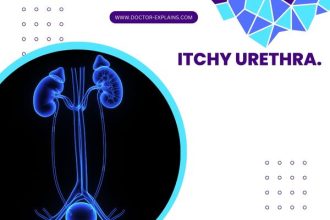Urinary tract infections (UTIs) are a common health issue affecting millions of people worldwide. As a result, many of you seek natural remedies like ginger to prevent and treat UTIs. In this article, we will explore whether ginger is an effective solution for UTIs by examining seven evidence-based facts.
The short answer:
Ginger may have some antibacterial properties against UTI-causing bacteria. But no high-quality studies on humans assessed its efficacy, so it does not replace standard UTI treatments. Furthermore, excessive ginger intake can cause side effects and, in rare cases, even mimic UTI symptoms.
Key Points in this article:
- Ginger has shown antibacterial activity against UTI-causing bacteria in experimental studies.
- There are no clinical trials assessing the efficacy of ginger in UTIs.
- Ginger is not a replacement for standard UTI treatments.
- Excessive ginger consumption can cause side effects.
- Overuse of ginger may cause UTI-like symptoms in rare cases.
- Ginger is not recommended for individuals with bleeding risk.
- Other natural remedies are better suited for UTI prevention.
FACT #1: Experimental studies showed that ginger is active against UTI bacteria
Ginger has demonstrated antibacterial properties in various experimental studies. Some of these studies have specifically tested ginger against bacteria known to cause UTIs, such as Escherichia coli (E. coli) and Staphylococcus saprophyticus.
In these studies, ginger has shown a potential to inhibit the growth of these bacteria. However, it’s important to note that these findings are based on laboratory experiments, and the efficacy of ginger in real-life scenarios remains unclear.
Here is a simplified summary of some experimental studies on ginger for UT (reference):
| Author, Year | Finding |
|---|---|
| Mohamad, 2019 | Ginger alcohol extract had an antimicrobial effect in UTIs case and no side effects were found. |
| Lagha, 2019 | Zingiber officinale did not show an antimicrobial effect against Escherichia coli isolates. |
| Mohammed, 2019 | Ginger showed antibacterial activity against E. coli with an inhibition zone of 15-19mm. |
| Kumar, 2018 | Ginger oil may had antibacterial activity against clinical isolates of E. coli. |
| Al-Zamily, 2017 | Ginger aqueous extracts (50% and 100%) showed an antimicrobial effect on isolated bacteria. |
| Mourad et al, 2016 | Red ginger had antibacterial activity against E. coli. |
| Tabassum, 2013 | Ginger showed broad-spectrum antibacterial activity, higher than ten standard antibiotics. |
| O. Al-Jiffri, 2011 | Red ginger had antibacterial activity against E. coli. |
Bear in mind that these are studies done on biological samples such as urine, and the researchers didn’t assess the effect of ginger oral intake.
FACT #2: However, No clinical trials assessed the efficacy of ginger in UTIs
While experimental studies have suggested that ginger may have antibacterial properties against UTI-causing bacteria, there are no clinical trials to confirm these findings in humans.
As a result, it is impossible to determine whether ginger can effectively treat or prevent UTIs based on the currently available evidence.
And here are why clinical trials are more important than experimental studies:
- Clinical trials directly test the effects of a food or supplement (such as ginger) on people, which is more relevant than testing on animals or cells.
- What works in a lab or on an animal (in experimental studies) doesn’t mean it will work for humans.
- These trials are done in a controlled way, which helps researchers understand if the food or supplement is truly causing the observed effects.
- Trials look at how well a food or supplement works and if it’s safe, including any side effects.
- The results of clinical trials can be applied to a broader group of people because they include diverse participants.
- Clinical trials provide stronger evidence than other studies, making them more useful for making health decisions.
FACT #3: At best, it is not a replacement for standard UTI treatments
Given the lack of clinical evidence supporting ginger’s efficacy in treating UTIs, it should not be considered a replacement for standard treatments.
UTIs are typically treated with antibiotics prescribed by your doctor.
If you suspect you have a UTI, it is essential to consult your doctor for proper diagnosis and treatment.
Depending only on natural remedies for UTI treatments can cause health hazards and profound damage to your urinary tract or kidney function.
FACT #4: Too much ginger per day causes side effects
While ginger is generally considered safe when consumed in moderate amounts, excessive intake can cause side effects. Some of the possible side effects include:
- Heartburn,
- diarrhea,
- stomach discomfort
- Additionally, ginger may interact with certain medications, such as blood thinners and antihypertensive drugs, and can increase the risk of bleeding.
Therefore, it is essential to consume ginger in moderation and consult your healthcare provider before using it as a supplement or remedy.
According to WebMD.com, consuming More than 5 grams of ginger daily may increase the incidence of side effects.
In the Below table, I’ve gathered what a 5-gram (the maximum safe dose to consume daily):
| Formulation | Approximate Conversion for 5 grams |
|---|---|
| Whole Fresh Ginger Root | 1-inch (2.5 cm) piece of fresh ginger |
| Ginger Paste | One teaspoon of ginger paste |
| Pickled Ginger (Gari) | 8-10 thin slices |
| Ginger Juice | One teaspoon of ginger juice |
| Ground Ginger | 1 2/3 teaspoons of ground ginger |
| Sliced or Chopped Dried Ginger | Use a kitchen scale to measure 5 grams |
| Ginger Tea | 1 2/3 teaspoons for steeping in hot water |
| Crystallized Ginger | Use a kitchen scale to measure 5 grams |
| Ginger Supplements | Refer to supplement label for dosage |
FACT #5: Ginger overuse may cause UTI-like symptoms in rare cases
In rare cases, excessive ginger consumption has been reported to cause urinary symptoms similar to UTIs. These symptoms may include painful urination (dysuria) and chronic bladder pain. A 2018 case report described a 43-year-old man who experienced chronic pain and dysuria after self-medicating with ginger tea for 15 years. After discontinuing the ginger tea, the man’s symptoms began to recede within one week and completely disappeared after eight weeks. Furthermore, no relapse was recorded during the six-month follow-up period.
FACT #6: Ginger is not recommended if you have a bleeding risk
As mentioned earlier, ginger can increase the risk of bleeding, especially when consumed in large amounts or combined with blood-thinning medications. If you have a bleeding disorder or are taking blood thinners, it is crucial to consult your healthcare provider before using ginger as a remedy or supplement.
FACT #7: For UTI prevention, there are better natural remedies than ginger
While ginger may have some antibacterial properties, it is not the most effective natural remedy for UTI prevention. Other natural remedies have shown more promising results in preventing UTIs, such as:
- Cranberry: Several studies have demonstrated that cranberry products, particularly cranberry juice, and supplements, may help prevent UTIs by preventing bacteria from adhering to the urinary tract.
- D-Mannose: This natural sugar is found in certain fruits and has been shown to help prevent UTIs by inhibiting the adherence of E. coli bacteria to the urinary tract.
- Probiotics: Probiotics, particularly Lactobacillus strains, can help maintain a healthy balance of bacteria in the urinary tract and may play a role in UTI prevention.
- Hydration: Drinking plenty of water and staying well-hydrated can help flush out bacteria from the urinary tract, reducing the risk of UTIs.
- Vitamin C: Vitamin C can help support the immune system and may reduce the risk of UTIs by increasing the acidity of urine, making it more challenging for bacteria to thrive in the urinary tract.
In conclusion, ginger may possess some antibacterial properties against UTI-causing bacteria, but insufficient clinical evidence supports its effectiveness in treating or preventing UTIs.
Moreover, excessive ginger consumption can cause side effects and even mimic UTI symptoms in rare cases.
While ginger is not the best natural remedy for UTI prevention, other remedies like cranberry, D-mannose, probiotics, hydration, and vitamin C have shown more promising results.
As always, consult your healthcare professional before using any natural remedy or supplement to treat or prevent UTIs or other health conditions.





